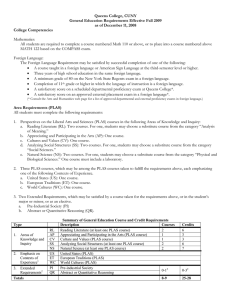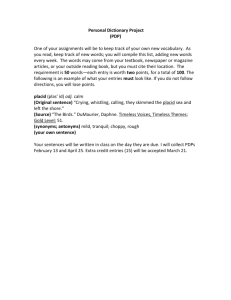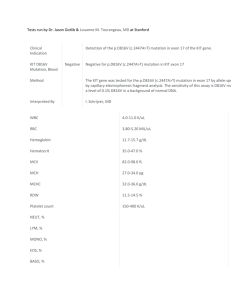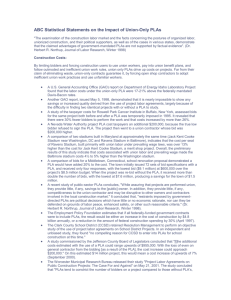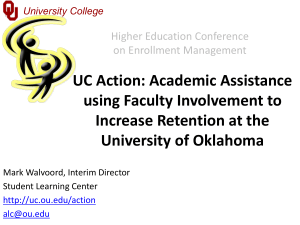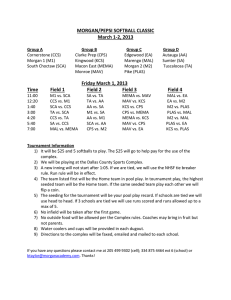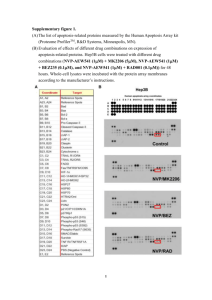Queens College Undergraduate Curriculum Committee
advertisement
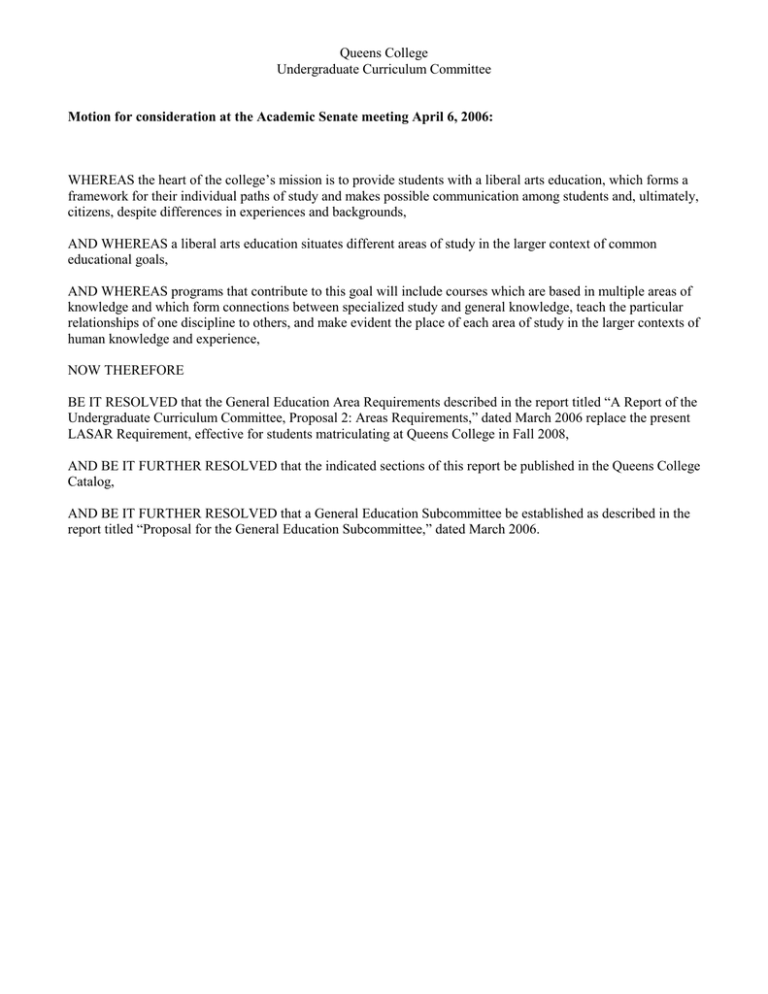
Queens College Undergraduate Curriculum Committee Motion for consideration at the Academic Senate meeting April 6, 2006: WHEREAS the heart of the college’s mission is to provide students with a liberal arts education, which forms a framework for their individual paths of study and makes possible communication among students and, ultimately, citizens, despite differences in experiences and backgrounds, AND WHEREAS a liberal arts education situates different areas of study in the larger context of common educational goals, AND WHEREAS programs that contribute to this goal will include courses which are based in multiple areas of knowledge and which form connections between specialized study and general knowledge, teach the particular relationships of one discipline to others, and make evident the place of each area of study in the larger contexts of human knowledge and experience, NOW THEREFORE BE IT RESOLVED that the General Education Area Requirements described in the report titled “A Report of the Undergraduate Curriculum Committee, Proposal 2: Areas Requirements,” dated March 2006 replace the present LASAR Requirement, effective for students matriculating at Queens College in Fall 2008, AND BE IT FURTHER RESOLVED that the indicated sections of this report be published in the Queens College Catalog, AND BE IT FURTHER RESOLVED that a General Education Subcommittee be established as described in the report titled “Proposal for the General Education Subcommittee,” dated March 2006. General Education at Queens College A Report of the Undergraduate Curriculum Committee Proposal 2: Area Requirements March 2006 Version 5.0.1 Undergraduate Curriculum Committee Disciplinary Area Requirements, v 5.0.2, March 2006 Page 2 Catalog Entry Area Requirements All students must complete the following requirements: 1. Perspectives on the Liberal Arts and Sciences (PLAS) courses in the following Areas of Knowledge and Inquiry: a. Reading Literature (RL): Two courses. For one, students may choose a substitute course from the category “Analysis of Meaning.” b. Appreciating and Participating in the Arts (AP): One course. c. Cultures and Values (CV): One course. d. Analyzing Social Structures (SS): Two courses. For one, students may choose a substitute course from the category “Social Sciences.” e. Natural Science (NS): Two courses. For one, students may choose a substitute course from the category “Physical and Biological Sciences.” One course must include a laboratory. 2. Three PLAS courses, which may be among the PLAS courses taken to fulfill the requirements above, each emphasizing one of the following Contexts of Experience. a. United States (US): One course. b. European Traditions (ET): One course. c. World Cultures (WC): One course. 3. Two Extended Requirements, which may be satisfied by a course taken for the requirements above, or in the student’s major or minor, or as an elective. a. Pre-Industrial Society (PI) b. Abstract or Quantitative Reasoning (QR). I. Goals and Description of Requirements [to be included in Bulletin] A. Perspectives on the Liberal Arts and Sciences (PLAS) Courses The Departments, Divisions, and Programs of the College include, as part of their subject or disciplinary offerings, courses that also provide Perspectives on the Liberal Arts and Sciences (PLAS courses). Through these courses students will make progress in acquiring awareness of the connections among different educational goals and expectations in modern life, of the characteristic modes of study in several disciplines, and of the content of different contexts of experience that shape modern academic discourse. All PLAS courses will address an area of knowledge and inquiry and most will include an emphasis on one of the contexts of experience (as these are listed above and described below). PLAS courses will: 1. Address how, in the discipline (or disciplines) of the course, data and evidence are construed and knowledge acquired; that is, how questions are asked and answered; 2. Position the discipline(s) in the liberal arts curriculum and the larger society; and 3. Address the goals defined in Parts B.1 and C below as appropriate for their subject matter. Each PLAS course will also, where appropriate to its discipline and subject matter 4. Be global or comparative in scope; 5. Consider diversity and the nature and construction of forms of difference; Undergraduate Curriculum Committee Disciplinary Area Requirements, v 5.0.2, March 2006 Page 3 6. Engage students in active inquiry; 7. Reveal the existence and importance of change over time; and 8. Use primary documents and materials. B. Areas of Knowledge and Inquiry All students will take one or two PLAS courses in each of the following areas (as indicated). Where a second course is required, students may take a substitute course, as defined in section B.2 1. PLAS courses will be offered in each of the following areas a. Reading Literature (RL) Words have continued fundamental importance as a means of transmitting ideas and points of view. The study of literature from various times and places offers students a way of achieving a deeper appreciation of their own lives and insight into the lives and thoughts of others, especially those whose perspectives, because of historical, cultural, racial, and gender differences, are different from their own. The actual practice of close study of literary texts leads not only to an understanding of the content of the texts themselves but also to a greater ability to understanding and appreciate written language. Courses that contribute to the goal of incorporating the advantages of reading literature will emphasize practice in reading and include courses that study narratives, poetry, essays or drama in their original language or in English translation. These courses would be taught in classes that, through discussion and writing, promote improvement of the students’ skills in understanding and their capacity for appreciation. Students are required to take two PLAS courses in this area, or one PLAS course and one substitute course in the category “Analysis of Meaning” as described in 2a. b. Appreciating and Participating in the Arts (AP) The performing and fine arts are central to social and cultural life. They express the outlooks and ideas of individuals and cultures over differences of time, space, culture, and experience. The skills of observing and listening to, performing and participating in, and appreciating and understanding the creative arts are interrelated and develop awareness of the role of these arts in human life. A course that contributes to the goal of developing awareness of the arts will acquaint students with a specific mode of creative expression in the performing or fine arts—art, architecture, film, photography, music, theater, or dance—by focusing on its history, enhancing its appreciation, or teaching its skills of participation. Students are required to take one PLAS course in this area. c. Culture and Values (CV) Human values and ideals are also expressed through religion, institutions, and the interactions of language, politics, philosophy, literature, arts, social organization, and beliefs that we call culture. By examining individual and social values involved in moral deliberation, and learning of the varied sources from which groups and individuals derive their ideas of ethics and morality, students can understand and appreciate ethical issues and express and defend moral choices in an informed and thoughtful way. A course that contributes to the goals of understanding and articulating values will make use of original source materials to explore how values and choices are expressed, either by studying a particular linguistic, religious, or regional culture or by examining a problem of ethics through the disciplines of philosophy, literature, or religious studies. Students are required to take one PLAS course in this area. d. Analyzing Social Structures (SS) Participation in our complex society and world relies on an understanding of the organization and function of different societies and cultures, of the nature of power and how different systems of politics and governance operate, of the development of states and nations and the relations among them, and of the Undergraduate Curriculum Committee Disciplinary Area Requirements, v 5.0.2, March 2006 Page 4 organization and operation of economic systems. The study of a social science provides insight into a specific problem and knowledge of the data, methods, perspectives, and theories of social inquiry and understanding. Courses that contribute to an awareness of social structures will represent two different departments that teach the major methods, concepts, and models used in the social sciences, will provide an understanding of the relations among the social sciences, and will emphasize such important themes as the historical development of states and societies, governmental and societal organizations, the role of ideas within human societies, and social and economic structures. Students are required to take two PLAS courses in this area, or one PLAS course and one substitute course in the category “Social Sciences” as described in 2b. e. Natural Science (NS) Scientific inquiry is a continuing and adapting process through which we examine and express the history and workings of the natural world. The methods and results of the natural sciences profoundly influence the modern understanding of our selves and our world and the activities of public and private lives. The study of science teaches basic principles underlying the operation of the natural world, the methods by which scientists discern, assemble, and interpret data and formulate and test hypotheses, develops understanding of the place and operations of scientific knowledge in the contemporary world, and reveals how ideas about science have affected the past and shape the present. Courses that contribute to the goal of understanding the methods, content, and role of the natural sciences should include familiarity with a body of knowledge in the physical or biological sciences, successful study of the methods of science, including the use of observation, the formation of hypotheses and the testing of models, experience and awareness of the impact of science on modern society. Students are required to take two PLAS courses in this area, or one PLAS course and one substitute course in the category “Physical and Biological Sciences” as described in 2c. At least one of these courses must include a laboratory component. In such courses, students should learn the process of interpreting the results of hands-on laboratory experiences and write reports which show proper calculations, analysis of results, and reconciliation of those results with theoretical expectations. 2. Substitutes for PLAS Courses in Areas of Knowledge and Inquiry For three areas of Knowledge and Inquiry (Reading Literature, Analyzing Social Structures, and Natural Science), in which two courses are required, instead of taking a second PLAS course, students may substitute an appropriate course in the area, as follows: a. Analysis of Meaning Substitute courses for “Reading Literature” will likely, though not necessarily, be from Arts and Humanities. Courses will provide practice in the analysis of meaning, will focus on a specific work or body of work (in any language or cultural tradition), on any forms of poetry, narrative, essay or drama, in film, or in the visual arts or music, and will involve students both in the acquisition of knowledge about the work studied and in the analysis of its meaning. b. Social Sciences Substitute courses for “Analyzing Social Structures” will likely, though not necessarily, be from social science departments. Courses will focus on using the methods of a discipline (excluding those that include only quantitative methods) and will apply them to the study of particular topics or problems. The two courses used to satisfy the Analyzing Social Structures requirement must be from different departments. c. Physical and Biological Sciences Substitute courses for “Natural Science” must be in the Physical or Biological sciences. As stated above, one of the two courses used to satisfy the Natural Science area requirement must include a laboratory. C. Contexts of Experience Undergraduate Curriculum Committee Disciplinary Area Requirements, v 5.0.2, March 2006 Page 5 Students must complete a PLAS course that emphasizes each of the following contexts of experience. Every course that fulfills this requirement will also fulfill an Areas of Knowledge and Inquiry requirement. Students may take these as additional courses if they wish. a. United States (US) The college’s educational goals are an expression of American political and cultural history, and one of the College’s most important aims is the preparation of students to contribute to American society. Understanding the emergence and operation of the United States as a distinct nation and as self-consciously defined and proclaimed democracy provides part of the context for the students’ own educational experience. A course that contributes to the goal of understanding the United States experience will examine its culture, history, or political and social institutions by studying such topics as the founding of US society and government; the role of migration in US society and its changing racial, ethnic, religious, and linguistic diversity; the development of democratic values and institutions and the contests over inclusion and exclusion; the history of US expansion and its accompanying intellectual and ideological developments, and the place and role of the United States in global contexts, in the past and in the present. b. European Traditions (ET) The intellectual and artistic traditions of Western civilization permeate thought in our contemporary society and culture, in the West and wherever Western culture has been copied or asserted. Awareness of the roots of Western thought is important to understanding our society and culture, and in particular to comprehending academic discourse. A course that contributes to an awareness of the tradition of thought, inquiry, and expression that characterizes Western civilization will emphasize an aspect of the culture or history of ancient Greece and Rome, or of a later period of European culture or history in which the continuing influence of ancient culture or the traditions of Western civilization can be noted. c. World Cultures (WC) The global interdependence of modern political, economic and cultural life requires an understanding of broad range of traditions, perspectives and concerns. The study of cultures and experience outside of the United States and the European tradition (World Cultures) is necessary to create that breadth. A course that contributes to an awareness of civilizations globally will focus on the study of one or more World Cultures or on a comparison between World Cultures or between a World Culture and a culture of the United States or of the European Tradition. D. Extended Requirements Students are required to complete one course on the pre-industrial world and one course which includes abstract or quantitative reasoning, as described below. These Extended Requirements may be met by courses taken to fulfill other requirements, including PLAS and substitute courses, general elective courses, or courses in a student’s major or minor. (Most College major programs are likely to include at least one of these). a. Pre-Industrial Society (PI) Awareness of the modern world is implicit in our daily lives and most college courses. However, “the past is another country,” and the modern world is characterized by profound changes in concepts and in the modes of existence, or by reactions against these. Students should be aware of the character of the preindustrial world as part of their full understanding of human experience. Study of the pre-industrial world also makes explicit, by contrast, the particular characteristics of modernity. A course that contributes to an awareness of the pre-industrial world will concentrate on the literature, art, history, thought, or social structure of a society before it is affected (internally or externally) by the development of industrialization, in order to understand it in its context. Undergraduate Curriculum Committee Disciplinary Area Requirements, v 5.0.2, March 2006 Page 6 b. Abstract or Quantitative Reasoning (QR) Abstract logic and quantitative reasoning determine the language of discourse in much academic scholarship and many industrial, economic, and political areas of modern life. It is important that students be able to share in and contribute to that discourse, in which information is presented in quantifiable forms, mathematical analysis is employed to discern patterns and relationships between variables, and abstract reasoning within formal systems of logic is used in intellectual thought and in practical activity. Informed and effective participation in modern life requires the ability to recognize the role of these methods in all areas of knowledge and to have familiarity with their use. Courses which contribute to the understanding of abstract or quantitative reasoning focus on such topics as the application of statistics to discovering the significance of data, formal systems of analysis, and the structure of systems of formal logic and languages, particularly mathematics, both pure and applied to major areas of technology and quantitative natural and social science. Type 1. Areas of Knowledge and Inquiry 2. Emphasis on Contexts of Experience1 3. Extended Requirements2 Totals 1 2 Summary of General Education Course and Credit Requirements Description Courses RL Reading Literature (at least one PLAS course) 2 AP Appreciating and Participating in the Arts (PLAS course) 1 CV Culture and Values (PLAS course) 1 SS Analyzing Social Structures (at least one PLAS course) 2 NS Natural Science (at least one PLAS course) 2 US United States (PLAS) ET European Traditions (PLAS) WC World Cultures (PLAS) PI Pre-industrial Society 0-12 QR Abstract or Quantitative Reasoning 8-9 Credits 6 3 3 6 7 0-32 25-28 These courses may also satisfy a Areas of Knowledge and Inquiry requirement and should therefore normally not require the taking of additional courses. It is expected that most students will satisfy at least one of these from among the courses fulfilling other requirements or their major. II. Course Approval Process [not for inclusion in the Bulletin] A. Approval for PLAS Courses 1. As described in the UCC document “Curriculum Administration,” PLAS courses will be submitted to the General Education Subcommittee of the UCC (GESC); the GESC will forward them with its recommendation to the UCC, which will report them to the Senate for final approval. The GESC, in conjunction with the Center for Teaching and Learning, will work with departments proposing courses to satisfy PLAS. In considering each course, the committee will consider how well the course fulfills the Perspectives on the Liberal Arts and Sciences criteria and the need to create a list balanced across disciplines and content area emphases, not the course’s comparability to other courses on the list. Where there are inadequate offerings in any portion of the list, the committee will work with the administration and departments to encourage new offerings. 2. Courses nominated for PLAS may be new courses specifically designed to meet a particular requirement, or may be adaptations of existing courses. Such adaptation is not expected to be so extensive as to preclude use of the course in a department’s curriculum. All courses on the PLAS list will have distinct department Undergraduate Curriculum Committee Disciplinary Area Requirements, v 5.0.2, March 2006 Page 7 numbers and not be merely special sections of other courses which may be their equivalent in the department’s own curriculum. 3. Periodic review of the General Education curriculum, including the continued use of courses satisfying PLAS, will also be done by the GESC, on a review schedule approved by the Senate on the recommendation of the UCC. Courses will be reviewed to ensure that the current syllabus is consistent with the syllabus approved, that the course is regularly offered, that full-time faculty participate actively in its teaching, and that the learning goals of the requirement(s) the course is meant to satisfy are being met. The list of PLAS courses as a whole will be reviewed to ensure appropriate representation of a variety of departments in courses with adequate enrollment, and optimal realization of the spirit of the General Education requirement, as described in section I. 4. PLAS course description in the catalog will include the two-letter abbreviations of the requirement(s) the course fulfills. A searchable on-line system should assist students in choosing courses. PLAS substitute course lists will also be printed in the catalog and available on line B. Approval for PLAS Substitute Courses 1. During the implementation of these requirements, departments will propose lists, either of courses to be considered, or of courses to be excluded from consideration, for PLAS substitute courses to the UCC, and the UCC will forward its recommendation to the Senate. While departments will normally submit courses in their divisional area, in some cases departments may request approval for certain courses in other areas. In subsequent years, departments will provide information on PLAS substitute courses as part of the description of new courses. Since approval is based on the course description, variable topic courses submitted for approval must include a sufficient description of the range of possible topics. 2. The published lists of approved Substitute courses for each area will indicate, under each Department’s heading, either the course numbers of the approved courses or “all except” and the numbers of the excluded courses, whichever is briefer. C. Approval for Extended Requirements The approval process for courses satisfying the Pre-Industrial and Quantitative Reasoning requirements will be the same as that for Substitute courses. Approved courses will have “(PI)” or “(QR)” appended to their descriptions and a searchable on-line system should assist students in choosing courses. The UCC will work with the departments and the Office of Teaching and Learning to assure that students are informed as part of the description of major requirements which of these requirements would also be met.
